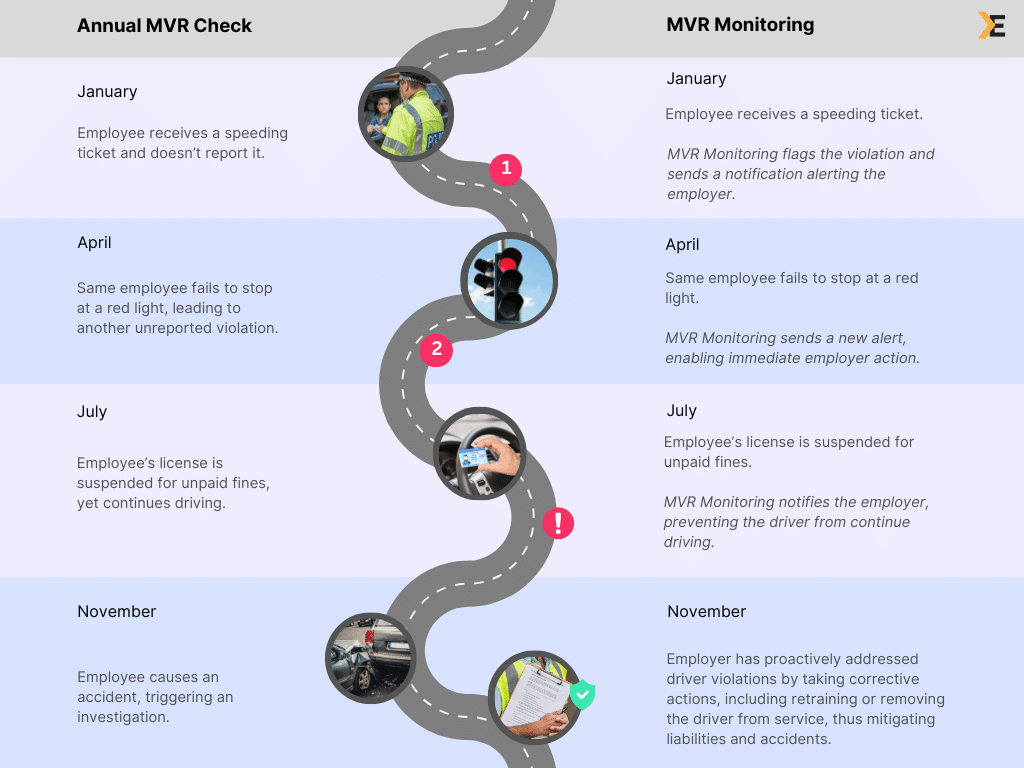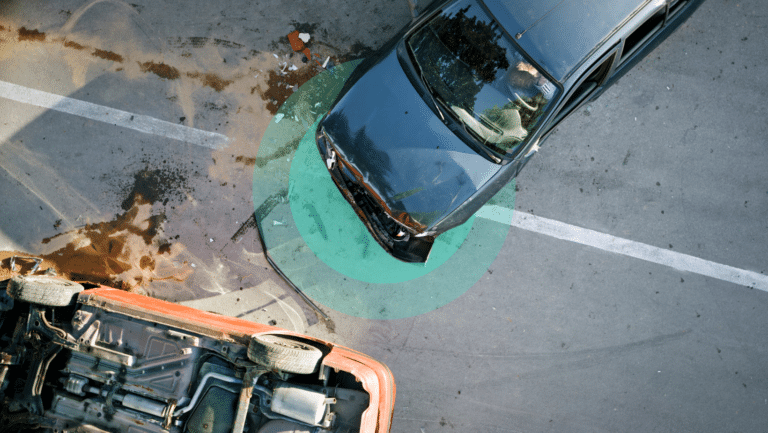4 Consequences of Ignoring MVR Monitoring

Driver safety and compliance are cornerstones of fleet management. Yet, many organizations overlook a critical tool: Continuous MVR Monitoring. Below, we explore four critical reasons why MVR monitoring isn’t just a best practice but an essential component that your fleet can’t afford to ignore in 2025 and beyond.
#1 Missed Violations and Suspensions
One of the biggest risks of not monitoring MVRs continuously is the chance of missing violations and critical changes in a driver’s record.
Did you know? On average, 41 million speeding tickets are issued annually in the U.S., and millions more violations are recorded for DUIs, reckless driving, and other infractions.
Drivers may log tens of thousands of miles annually, meaning violations can easily occur within a 12-month period. Without continuous monitoring, these incidents remain hidden until the next annual MVR pull—or worse, an accident.
Let’s put this in a practical example comparing the outcomes of relying just on annual MVR checks vs Continuous Monitoring:
Relying on Annual MVR Checks:
December 2024: Annual MVR gets pulled and shows as clear.
- January: The driver receives a speeding ticket but doesn’t report it.
- April: The same driver fails to stop at a red light, leading to another unreported violation.
- July: The license is suspended for unpaid fines, yet the driver continues driving for your company.
- November: The driver causes an accident, triggering an investigation. The hidden violations and suspension come to light, exposing your company to liability.
Now let’s put the same scenario but with MVR Monitoring in place:
- January: The driver receives a speeding ticket but doesn’t report it. *MVR Monitoring flags the conviction and sends a notification alerting the employer.
- April: The driver runs a red light. *The system alerts and updates the driver’s record, enabling immediate employer action.
- July: The driver’s license is suspended for unpaid fines. *MVR Monitoring notifies the employer, preventing the driver from continuing to drive company vehicles.
- November: The employer has proactively addressed driver violations by taking corrective actions, including retraining or removing the driver from service, thus mitigating liabilities and accidents.
*MVR Monitoring frequency and information reported varies by state. Contact us for specifics.

KEY TAKEAWAY ⚠️ Annual checks leave your fleet vulnerable to months of hidden risk, while continuous monitoring provides near real-time visibility, enabling swift corrective action against risky behaviors.
#2 Undetected blind spots in driver behavior
Without continuous monitoring, fleets are blind to the full scope of driver risk. Violations, suspensions, and accidents aren’t isolated events; they’re part of a broader pattern of behavior that reveals potential safety risks, compliance gaps, and performance issues within your fleet.
Relying on self-reporting policies and annual MVR pulls leaves critical gaps in your ability to track and manage driver behavior. These “traditional methods” have proven time and again to be costly and sometimes catastrophic for fleets.
With MVR Monitoring in place, you have visibility into all driver MVR activity, allowing you to spot trends, take quick action, and keep your fleet safer.
KEY TAKEAWAY ⚠️ Traditional methods create blind spots in your understanding of driver behavior. MVR Monitoring technology removes these gaps, offering continuous oversight of your fleet.
#3 Increased likelihood of accidents and liability

Studies have proven this time and again—driver behavior is a strong indicator of future risk. Drivers with a history of violations, such as speeding, DUIs, or reckless driving, are statistically more likely to repeat those behaviors. If these risks are not identified and addressed through regular monitoring, dangerous patterns can continue, increasing the likelihood of accidents. If you’re not actively keeping track of your driver’s history, you’re simply leaving your company exposed to all types of risk. Read more: 4 Traffic Violations Contributing To Fleet Accidents.
Additionally, if a driver with unknown or unaddressed violations is involved in an accident, your company will be held responsible. This could easily lead to costly lawsuits such as nuclear verdicts, increased insurance premiums, and damage to your company’s reputation.
KEY TAKEAWAY ⚠️ Ignoring driver histories increases the risk of accidents, lawsuits, and reputation damage. Proactively monitoring violations helps protect your fleet and bottom line.
#4 Failed regulatory compliance
Federal Motor Carrier Safety Administration (FMCSA) audits and inspections often focus on driver qualification files and safety protocols, making it critical to have accurate and up-to-date driver data.
Without a driver file management and monitoring system in place, these issues can easily slip through the cracks. What may seem like minor oversights—such as expired medical certificates or missing documents—can lead to serious compliance failures, costly fines, and damaged CSA Scores.
Continuous MVR Monitoring helps ensure your fleet exceeds compliance standards by instantly flagging violations, expired licenses, outdated medical cards, and missed driver files. Read more: Avoid This Top FMCSA Violations With MVR Monitoring.
KEY TAKEAWAY ⚠️ It’s easy to fall for FMCSA violations. Continuous MVR Monitoring can help keep your fleet compliant by proactively catching new violations and driver file gaps.
Why Your Fleet Can’t Afford to Wait
Every day your fleet operates without MVR Monitoring, you’re rolling the dice with safety, compliance, and your bottom line. Just like health insurance protects you from unexpected medical costs, MVR Monitoring safeguards your fleet from costly incidents.
The investment in MVR Monitoring is small, especially compared to the immense value it delivers. It’s not about the “what if” anymore—it’s about being prepared for the inevitable. Violations and unsafe driving habits can spiral into serious consequences, but with MVR Monitoring, you stay ahead of risks.
For a fraction of the potential cost of a single accident or compliance issue, you can protect your drivers, assets, and reputation. Take the first step toward a safer, smarter fleet today.
*We are not lawyers. Consult with your legal counsel to ensure your processes and procedures meet/ or exceed safety standards and compliance regulations. Please read our legal disclaimer.






